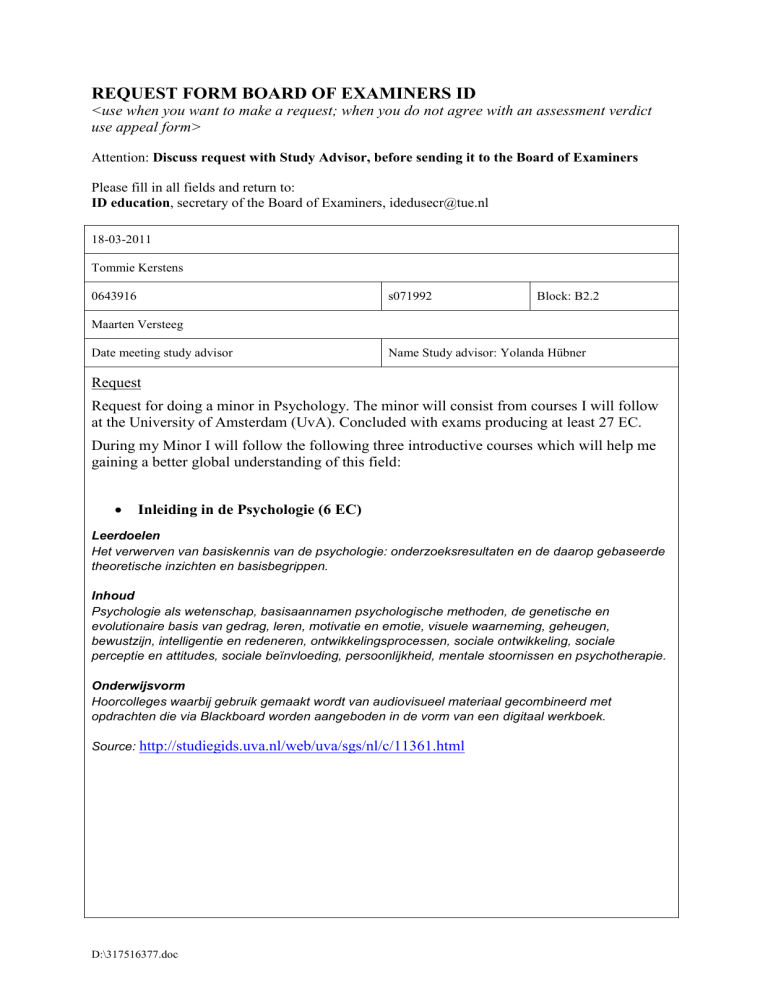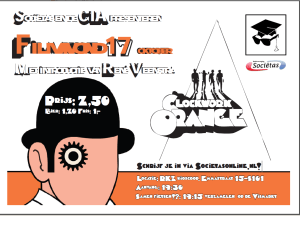
REQUEST FORM BOARD OF EXAMINERS ID
<use when you want to make a request; when you do not agree with an assessment verdict
use appeal form>
Attention: Discuss request with Study Advisor, before sending it to the Board of Examiners
Please fill in all fields and return to:
ID education, secretary of the Board of Examiners, idedusecr@tue.nl
18-03-2011
Tommie Kerstens
0643916
s071992
Block: B2.2
Maarten Versteeg
Date meeting study advisor
Name Study advisor: Yolanda Hübner
Request
Request for doing a minor in Psychology. The minor will consist from courses I will follow
at the University of Amsterdam (UvA). Concluded with exams producing at least 27 EC.
During my Minor I will follow the following three introductive courses which will help me
gaining a better global understanding of this field:
Inleiding in de Psychologie (6 EC)
Leerdoelen
Het verwerven van basiskennis van de psychologie: onderzoeksresultaten en de daarop gebaseerde
theoretische inzichten en basisbegrippen.
Inhoud
Psychologie als wetenschap, basisaannamen psychologische methoden, de genetische en
evolutionaire basis van gedrag, leren, motivatie en emotie, visuele waarneming, geheugen,
bewustzijn, intelligentie en redeneren, ontwikkelingsprocessen, sociale ontwikkeling, sociale
perceptie en attitudes, sociale beïnvloeding, persoonlijkheid, mentale stoornissen en psychotherapie.
Onderwijsvorm
Hoorcolleges waarbij gebruik gemaakt wordt van audiovisueel materiaal gecombineerd met
opdrachten die via Blackboard worden aangeboden in de vorm van een digitaal werkboek.
Source: http://studiegids.uva.nl/web/uva/sgs/nl/c/11361.html
D:\317516377.doc
Cognitive Psychologie (6 EC)
Leerdoelen
Introductie in de cognitieve psychologie. Deelonderwerpen: waarneming, aandacht, geheugen, leren,
taal, denken en probleem oplossen.
Inhoud
In deze cursus wordt een inleiding gegeven in de psychologische functieleer. In de eerste plaats komt
aan de orde de waarneming: de wijze waarop de hersens een beeld van de omgeving construeren op
basis van informatie die via de zintuigen binnenkomt. Het geconstrueerde beeld is selectief: veel
informatie die wel in de omgeving aanwezig is, wordt niet in de waarneming gerepresenteerd.
Daarom komt als tweede onderwerp de (selectieve) aandacht aan bod, dat is de wijze waarop de
scheiding tussen wel en niet verwerkte informatie tot stand komt. Vervolgens wordt aandacht besteed
aan de werking van het geheugen: de wijze waarop informatie wordt verworven, in het geheugen
wordt opgeslagen, en op een later tijdstip kan worden teruggehaald. Bij alle processen van
informatieverwerking in het brein speelt taal een belangrijke rol. Daarom wordt ruim aandacht
besteed aan de wijze waarop taal (gesproken en geschreven) wordt verwerkt. Maar ervaringen
worden niet alleen als expliciete herinneringen in het geheugen opgeslagen, ze hebben ook gevolgen
voor het latere gedrag. De rol van leren en impliciet geheugen worden in de cursus besproken. Tot
slot krijgen de typisch menselijke capaciteiten in ‘hogere’ functies ruim aandacht. Zoals het vermogen
tot redeneren, het nemen van beslissingen en het oplossen van complexe problemen.
Source: http://studiegids.uva.nl/web/uva/sgs/nl/c/11362.html
D:\317516377.doc
Ontwikkelingpsychologie (6 EC)
Leerdoelen
Het introduceren van het vakgebied van de ontwikkelingspsychologie. Ontwikkelingspsychologie
bestudeert psychologische processen vanuit een ontwikkelingsbenadering. Dat kan gebeuren
vanwege verschillende redenen. Ten eerste is het op zichzelf interessant om ontwikkeling in
psychologische functies te onderzoeken. Denk aan vragen als: Hoe zou een baby denken? En hoe
kunnen we dat onderzoeken? Hoe kan uit dit denken het denken ontstaan van een grootmeester
schaken? Waarom ontwikkelt het ene kind zich probleemloos en raakt een ander kind steeds in de
knel? Hoe zouden ouders en school moeten inspelen op het zich ontwikkelende brein van hun
kind/leeerling? Wat drijft adolescenten en hoe wijkt dit af van gesettelde vijftigers? Ten tweede kan
een ontwikkelingsbenadering inzicht geven bij diverse complexe fenomenen door hun ontstaan te
bestuderen, denk aan redeneren, bewustzijn en probleemgedrag. Deze benadering kan toegepast
worden op normale ontwikkeling bij kinderen (klassieke ontwikkelingspsychologie), maar ook bij
abnormale ontwikkeling (ontwikkelingspsychopathologie), en bij andere leeftijdsgroepen, zoals
adolescenten en ouderen (“lifespan” benadering).
Inhoud
In de cursus wordt een aantal belangrijke theorieën uit de ontwikkelingspsychologie behandeld,
waarbij ook aandacht is voor de historische context van de ideeën en hun bedenkers. Verder wordt
een aantal belangrijke thema’s behandeld en methoden waarmee het onderzoek verricht wordt. Er is
aandacht voor klassiek en recent onderzoek uit de ontwikkelingspsychologie op diverse terreinen,
zoals biologische, cognitieve, emotionele en sociale ontwikkeling. Naast theorie wordt er ook een link
gelegd met de praktijk, zowel wat betreft toepassingen in het onderwijsdomein (school) als in de
klinische ontwikkelingspsychologie. In de colleges zal in veel gevallen het onderwerp geïntroduceerd
worden aan de hand van de ideeën en experimenten van een historische voorganger, gevolgd door
recent werk op dit terrein en waar mogelijk toepassingen
Source: http://studiegids.uva.nl/web/uva/sgs/nl/c/11368.html
D:\317516377.doc
With these three introductive courses finished I am allowed to follow more specific courses
so called Specialisatievakken and Mastervakken. For these courses multiple possibilities are
available to fill in the remaining 9 EC.
One course that I think has a good relation to Industrial Design and was recommended to me
by the Psychology Faculty is: Omgevingspsychologie en de Psychologie van het Ontwerpen.
Which on its own delivers the remaining 9 EC. I will search for possibilities for these
specific courses to see if any other course suits my development better.
Omgevingspsychologie en De Psychologie van het Ontwerpen (9 EC)
Leerdoelen
De student vertrouwd maken met theorie, onderzoek en onderzoeksmethoden van de
omgevingspsychologie en met theorie over en onderzoek van het architectonisch ontwerpproces.
Inhoud
In deze cursus wordt zowel aandacht besteed aan toegepast psychologisch onderzoek
(omgevingspsychologie) als aan cognitief psychologisch onderzoek van het denken en
probleemoplossen (architectonisch ontwerpen). De omgevingspsychologie houdt zich bezig met de
wederzijdse invloed van de (gebouwde en natuurlijke) omgeving en het gedrag. Het eerste deel van
de cursus geeft een systematisch en verdiept overzicht van terreinen van onderzoek,
onderzoeksmethoden, theorievorming en praktische implicaties van onderzoek. Kenmerkend is het
multidisciplinaire karakter. Ook zijn verschillende deelgebieden van de psychologie
vertegenwoordigd: functieleer (perceptie en cognitie van de omgeving) en sociale psychologie
(omgevingsattituden, milieugedrag). Het tweede deel van de cursus behandelt prescriptieve en
descriptieve modellen van het architectonisch ontwerpproces; daarbij wordt ingegaan op
theorievorming en -toetsing.
Source: http://studiegids.uva.nl/web/uva/sgs/nl/c/8907.html
D:\317516377.doc
How a minor Psychology relates to me as a Designer
Psychology drew my attention a while back, I read books on mental issues and became more
interested in this subject. I never really came up with the idea to implement this in my
designs, until the end of last semester when I decided this would be a very interesting
direction for design to head into and based my vision upon this.
In my current project I use my psychology based vision as the basics for the design process
and work from this point on; exploring product possibilities that could for example enhance
communication, a product that could make people reflect upon their emotions or behaviors, a
product that could change human behavior, all these examples (and many more are possible)
have their basis in human psychology. Taking psychology as a starting point for design has
for me already proven its great value.
I think that I as a designer will benefit greatly from understanding psychology better, by
obtaining both a broader and deeper understanding of this field I can open my eyes further
and use this tool to a much greater extend then I currently do*. As every book I read on
psychology and mental issues opens my eyes to new design possibilities I am sure a minor
will greatly boost inspiration and design quality for my future projects.
Psychology enhances industrial design:
Products adding to human psychology, helping users with problems in their psychology
(mental issues), products influencing user’s emotions, behaviors and psychological
development.
Understanding decisions people make while using a/your product and understand the
emotions behind these decisions, taking the design a step beyond and improve design in its
very basic psychological content to enhance its influence on people and their psychology.
Having knowledge on human psychology can help during the design process by making
decisions that improve the design towards supporting human psychology.
Fitting the proposed minor into the Competency System.
To place Psychology into the established Industrial Design competency model used on our
faculty I state the following benefits of this minor per competency. Note that I only mention
the competencies I think are the closest related to the subject and benefit the most, also
consider me being a beginner in this field and expect this list to grow and improve over time
as I become more acquainted within this field. Also I do understand that most probably the
Board of Examiners understands these points I mention, but I wanted to add this to complete
my proposal by showing how things come together:
Ideas and Concepts
Using my knowledge on this field for brainstorming/thinking of concepts, a starting point to
look for interesting design opportunities.
User Focus and Perspective
Understanding the user’s thoughts and emotions on a deeper level, improving design in many
possible ways.
D:\317516377.doc
Socio-cultural awareness
Social events can often be driven by human needs and desires, I think important subjects of
psychology.
Form and Senses
How people perceive the world is very personally and is created by the way people think, the
way people think is influenced by experiences throughout life. Understanding how thinking
and the influences of these experiences work could reveal why people have certain emotions
with certain aesthetics.
Multidisciplinary Teamwork and Communication
Understanding people helps to function within teams, especially people from other
disciplines can differ much in their way of perceiving, thinking and communicating. Having
a better knowledge on human psychology helps to understand these differences leading to
better communication.
Self Directed and Continuous learning
Analyzing my own improvements on a mental level and reflecting on my thoughts and
emotions that led to certain decisions could be improved by a better understanding of the
workings of my own psychology.
Analyzing Complexity.
Better understanding of this field helps me to handle more complex problems in relation to
this field.
D:\317516377.doc












